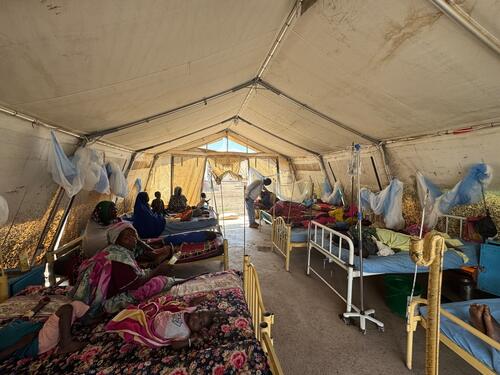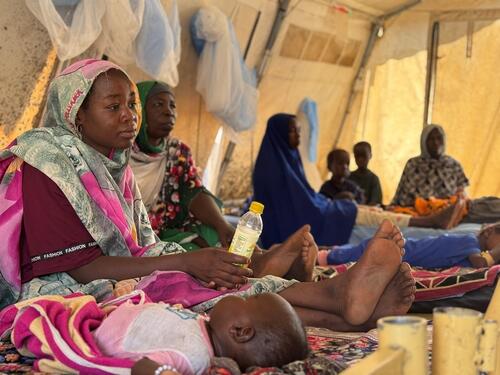Port Sudan– For a year now, Médecins Sans Frontières (MSF) teams in Darfur, Sudan, have been witnessing outbreaks of measles in the four Darfur states where we currently work. While massive vaccination campaigns are finally ongoing in several locations across the region, MSF calls on health authorities and medical organisations to increase efforts to catch up on the immunisation of children who have never been vaccinated.
The first surge of measles cases observed and treated by MSF were in June 2024 in Rokero, in Central Darfur, where MSF teams have been running the local Ministry of Health hospital since 2020. At the start of 2025, cases were also reported in East Jebel Marra, South Darfur, and in Forbrenga, West Darfur. More recently, new surges are also being observed in Zalengei, Sortony, and in Tine, East Chad – all places where we run activities.
From June 2024 until the end of May 2025, more than 9,950 patients were treated for measles in health facilities run or supported by MSF in the region. Around 2,700 were complicated cases requiring hospitalisation, and 35 deaths were recorded. To manage the influx of patients, we had to expand our paediatric bed capacity in three hospitals.
Such reactive campaigns are only a band-aid to an open wound unless massive efforts are put in place on immunisation and prevention across Darfur.Dr Cecilia Greco, medical coordinator for Central Darfur
One of the root causes of this situation is the region’s already low immunisation coverage.
“In Forbrenga, 30 per cent of the measles patients we are receiving are above five years but only 5 per cent of them are vaccinated,” says Sue Bucknell, deputy head of mission in West Darfur. “This suggests that the lack of vaccination dates back further than the recent conflict.”
“The ongoing conflict is also contributing to this outbreak, constraining the capacities of medical staff to both prevent and respond to outbreaks of contagious diseases,” says Dr Cecilia Greco, medical coordinator for Central Darfur. “Mass population displacement has made the illness spread even faster across the region, further complicating the situation.”
Since the war broke out, constant administrative impediments and regular blockades of key supply roads have caused vaccine shortages throughout Darfur. This led to disruption in routine immunisation programmes in several locations, sometimes for months. In Sortony, for example, an internally displaced people’s camp in North Darfur hosting more than 55,000 people, vaccination activities totally stopped from May 2024 to February 2025.

These constraints and shortages have also limited medical organisations’ capacity to roll out proper response campaigns. Last year, MSF carried out several vaccination campaigns, such as in November 2024 in North Jebel Marra where 9,600 children were vaccinated.
However, due to limited vaccine supplies, our teams were forced to reduce the target number and to exclude children over age five, despite clear needs. This inevitably reduced the long-term impact of these campaigns. In North Jebel Marra, while the vaccination campaign initially slowed the outbreak, cases began to rise sharply again from February.
Although mass vaccination campaigns are now happening in different parts of Darfur, negotiations and procedures have been lengthy. After MSF first raised the alarm about the multiple surges our teams were witnessing, it took months before the Federal Ministry of Health in Port Sudan and UNICEF released the needed vaccines from their stocks, finally enabling mass vaccination campaigns to be launched in different areas of Darfur.
Last week, 55,800 children from age nine months to 15 years were vaccinated in Forbrenga as part of a campaign led by the Ministry of Health and supported by MSF. Around 93,000 more children are set to receive the vaccine in North Jebel Marra and Sortony by the end of this week, in a similar campaign.
It is essential that federal and local health authorities, UN agencies and all medical organisations on the ground collaborate... to catch up on the vaccination of all the children left behind.Dr Cecilia Greco, medical coordinator for Central Darfur
“Even if they represent a certain achievement, these campaigns should have happened much sooner. Many measles cases and their consequences could have been prevented,” says Dr Greco. “And as much as they are needed, such reactive campaigns are only a band-aid to an open wound unless massive efforts are put in place on immunisation and prevention across Darfur, including its most remote areas.”
There is the threat of further outbreaks of disease unless such efforts are initiated.
“Measles is not the only contagious illness currently present in Darfur with the potential to turn into outbreaks,” says Bucknell. “Over the last 10 days, about 200 suspected cholera cases were brought to MSF-supported health facilities in two different Darfur states. This follows a significant cholera outbreak in Khartoum state and other parts of Sudan.”
“It is essential that federal and local health authorities, UN agencies and all medical organisations on the ground collaborate, not only to catch up on the vaccination of all the children left behind by immunisation programmes over the years, but also to enhance their ability to respond quickly and efficiently should any other outbreaks, like cholera, start spreading over Darfur,” says Dr Greco. “This includes the capacity to supply vaccines in and across Sudan, without facing the same impediments.”



